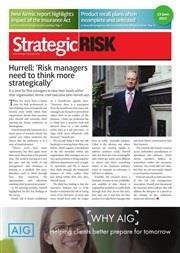Traditional risk management techniques may become less appropriate to deal with new risks

Risk managers must try to ensure that their risk culture evolves so that they keep up with the fast-changing risk landscape.
James Martin, client and distribution leader at XL Catlin, says risk management continues to play a pivotal role in moving business forward.
“Our thinking is that as companies innovate, embrace new technologies and become more connected there is a danger that traditional, well established risk management techniques may become less appropriate to deal with the new and evolving risks that this innovation brings. Risk managers are facing the need to foresee, understand and deal with risks they’ve never seen before and with no past history to review,” he told StrategicRISK, ahead of yesterday’s workshop on future-proofing your risk culture.
During the workshop, Martin examined the results of a survey carried out by Gracechurch Consulting, which asked UK risk managers about their personal values, their department’s and their company’s current cultural values, and their desired cultural values.
“In the survey that we undertook with Gracechurch, we asked risk managers to outline what they consider to be the barriers to innovation and the strongest drivers of innovation in risk management in the UK. The results of the survey will help us all better understand how the fast changing risk landscape is affecting risk culture,” Martin explains.
One respondent noted, for example, that incremental change in risk management culture is not enough to keep pace with the realities of digitalisation, artificial intelligence, and changing consumer behaviour.
Martin says the workshop aimed to enable risk managers to explore ways in which their culture and behaviours can be adapted to keep them relevant as their companies and industries innovate.
“There’s no doubt that as the world has progressed, digitalisation and connectivity have almost exponentially increased the pace of change and the scale of risk that organisations are facing,” he says.
“It is all too easy to see risks as barriers to progress. But risk can create opportunity. If you look at risk in a negative way it can prevent you from doing things, but if you view risk positively then it can help support innovation. A strong risk culture allows organisations to embrace this concept and thereby support innovation by properly analysing and leveraging available data, and understanding and either mitigating or transferring risk. This needs to be at the heart of a business and should become an integral part of the decision-making process to be truly effective.”




















No comments yet